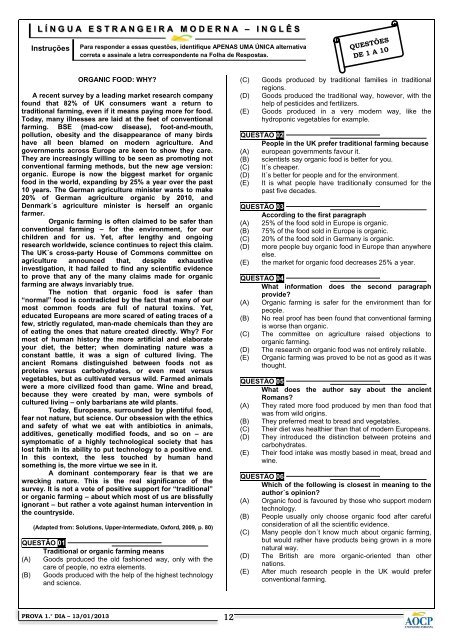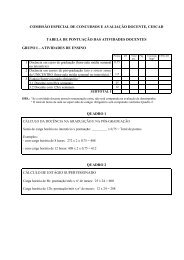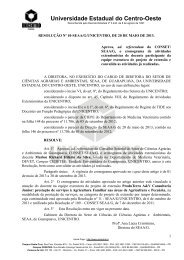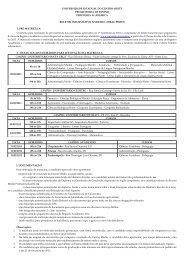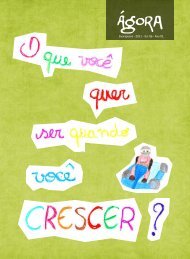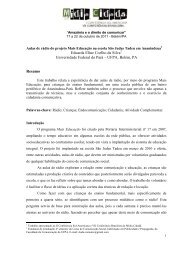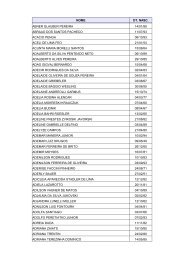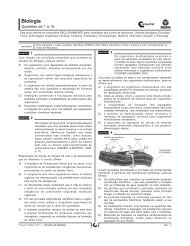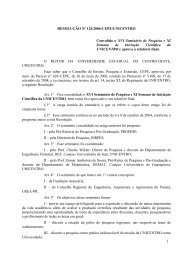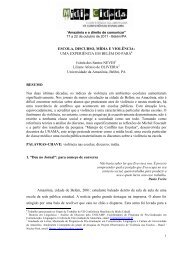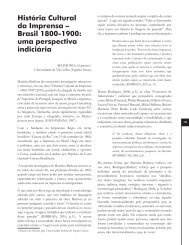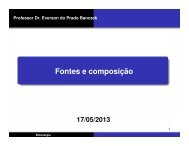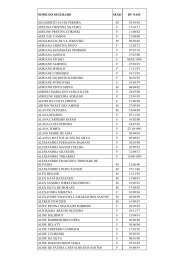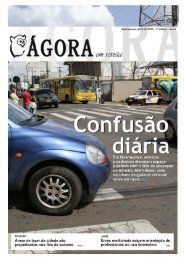Provas - Universidade Estadual do Centro-Oeste
Provas - Universidade Estadual do Centro-Oeste
Provas - Universidade Estadual do Centro-Oeste
Create successful ePaper yourself
Turn your PDF publications into a flip-book with our unique Google optimized e-Paper software.
L Í N G U A E S T R A N G E I R A M O D E R N A – I N G L Ê S<br />
Instruções<br />
PROVA 1.° DIA – 13/01/2013<br />
Para responder a essas questões, identifique APENAS UMA ÚNICA alternativa<br />
correta e assinale a letra correspondente na Folha de Respostas.<br />
ORGANIC FOOD: WHY?<br />
A recent survey by a leading market research company<br />
found that 82% of UK consumers want a return to<br />
traditional farming, even if it means paying more for food.<br />
Today, many illnesses are laid at the feet of conventional<br />
farming. BSE (mad-cow disease), foot-and-mouth,<br />
pollution, obesity and the disappearance of many birds<br />
have all been blamed on modern agriculture. And<br />
governments across Europe are keen to show they care.<br />
They are increasingly willing to be seen as promoting not<br />
conventional farming methods, but the new age version:<br />
organic. Europe is now the biggest market for organic<br />
food in the world, expanding by 25% a year over the past<br />
10 years. The German agriculture minister wants to make<br />
20% of German agriculture organic by 2010, and<br />
Denmark´s agriculture minister is herself an organic<br />
farmer.<br />
Organic farming is often claimed to be safer than<br />
conventional farming – for the environment, for our<br />
children and for us. Yet, after lengthy and ongoing<br />
research worldwide, science continues to reject this claim.<br />
The UK´s cross-party House of Commons committee on<br />
agriculture announced that, despite exhaustive<br />
investigation, it had failed to find any scientific evidence<br />
to prove that any of the many claims made for organic<br />
farming are always invariably true.<br />
The notion that organic food is safer than<br />
“normal” food is contradicted by the fact that many of our<br />
most common foods are full of natural toxins. Yet,<br />
educated Europeans are more scared of eating traces of a<br />
few, strictly regulated, man-made chemicals than they are<br />
of eating the ones that nature created directly. Why? For<br />
most of human history the more artificial and elaborate<br />
your diet, the better; when <strong>do</strong>minating nature was a<br />
constant battle, it was a sign of cultured living. The<br />
ancient Romans distinguished between foods not as<br />
proteins versus carbohydrates, or even meat versus<br />
vegetables, but as cultivated versus wild. Farmed animals<br />
were a more civilized food than game. Wine and bread,<br />
because they were created by man, were symbols of<br />
cultured living – only barbarians ate wild plants.<br />
Today, Europeans, surrounded by plentiful food,<br />
fear not nature, but science. Our obsession with the ethics<br />
and safety of what we eat with antibiotics in animals,<br />
additives, genetically modified foods, and so on – are<br />
symptomatic of a highly technological society that has<br />
lost faith in its ability to put technology to a positive end.<br />
In this context, the less touched by human hand<br />
something is, the more virtue we see in it.<br />
A <strong>do</strong>minant contemporary fear is that we are<br />
wrecking nature. This is the real significance of the<br />
survey. It is not a vote of positive support for “traditional”<br />
or organic farming – about which most of us are blissfully<br />
ignorant – but rather a vote against human intervention in<br />
the countryside.<br />
(Adapted from: Solutions, Upper-Intermediate, Oxford, 2009, p. 80)<br />
QUESTÃO 01<br />
Traditional or organic farming means<br />
(A) Goods produced the old fashioned way, only with the<br />
care of people, no extra elements.<br />
(B) Goods produced with the help of the highest technology<br />
and science.<br />
12<br />
(C) Goods produced by traditional families in traditional<br />
regions.<br />
(D) Goods produced the traditional way, however, with the<br />
help of pesticides and fertilizers.<br />
(E) Goods produced in a very modern way, like the<br />
hydroponic vegetables for example.<br />
QUESTÃO 02<br />
People in the UK prefer traditional farming because<br />
(A) european governments favour it.<br />
(B) scientists say organic food is better for you.<br />
(C) It´s cheaper.<br />
(D) It´s better for people and for the environment.<br />
(E) It is what people have traditionally consumed for the<br />
past five decades.<br />
QUESTÃO 03<br />
According to the first paragraph<br />
(A) 25% of the food sold in Europe is organic.<br />
(B) 75% of the food sold in Europe is organic.<br />
(C) 20% of the food sold in Germany is organic.<br />
(D) more people buy organic food in Europe than anywhere<br />
else.<br />
(E) the market for organic food decreases 25% a year.<br />
QUESTÃO 04<br />
What information <strong>do</strong>es the second paragraph<br />
provide?<br />
(A) Organic farming is safer for the environment than for<br />
people.<br />
(B) No real proof has been found that conventional farming<br />
is worse than organic.<br />
(C) The committee on agriculture raised objections to<br />
organic farming.<br />
(D) The research on organic food was not entirely reliable.<br />
(E) Organic farming was proved to be not as good as it was<br />
thought.<br />
QUESTÃO 05<br />
What <strong>do</strong>es the author say about the ancient<br />
Romans?<br />
(A) They rated more food produced by men than food that<br />
was from wild origins.<br />
(B) They preferred meat to bread and vegetables.<br />
(C) Their diet was healthier than that of modern Europeans.<br />
(D) They introduced the distinction between proteins and<br />
carbohydrates.<br />
(E) Their food intake was mostly based in meat, bread and<br />
wine.<br />
QUESTÃO 06<br />
Which of the following is closest in meaning to the<br />
author´s opinion?<br />
(A) Organic food is favoured by those who support modern<br />
technology.<br />
(B) People usually only choose organic food after careful<br />
consideration of all the scientific evidence.<br />
(C) Many people <strong>do</strong>n´t know much about organic farming,<br />
but would rather have products being grown in a more<br />
natural way.<br />
(D) The British are more organic-oriented than other<br />
nations.<br />
(E) After much research people in the UK would prefer<br />
conventional farming.


